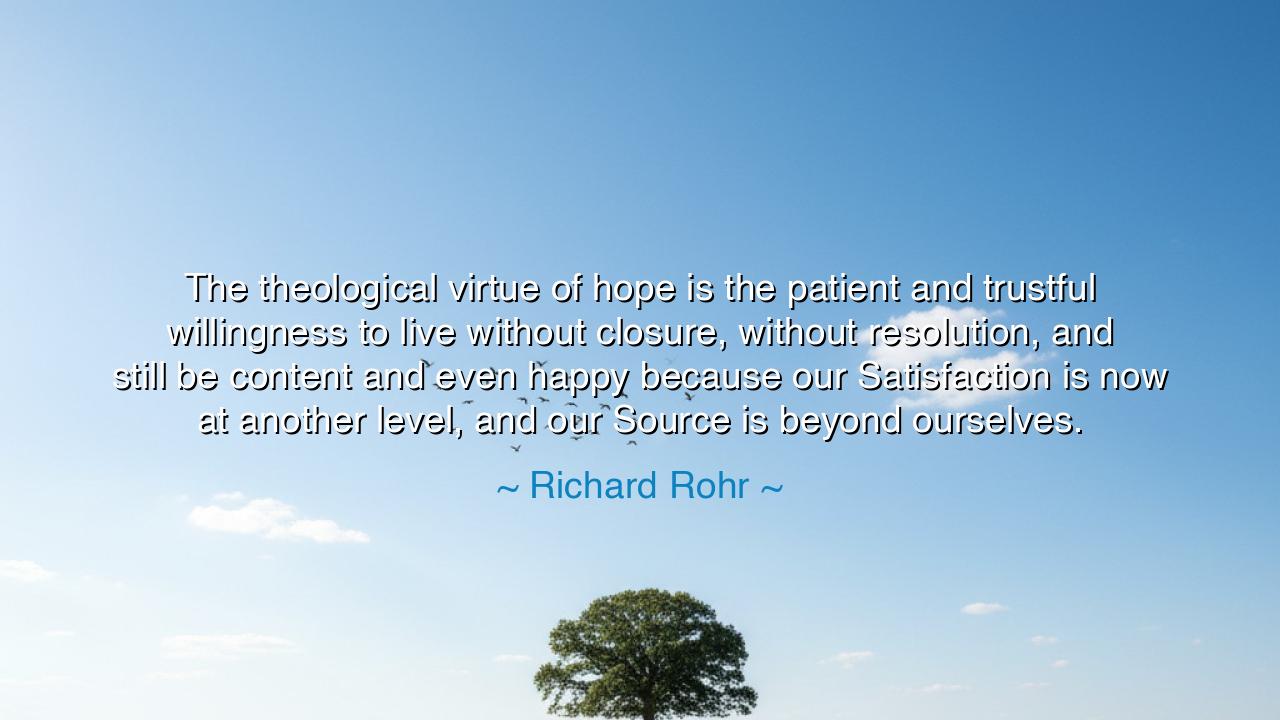
The theological virtue of hope is the patient and trustful
The theological virtue of hope is the patient and trustful willingness to live without closure, without resolution, and still be content and even happy because our Satisfaction is now at another level, and our Source is beyond ourselves.






The words of Richard Rohr — “The theological virtue of hope is the patient and trustful willingness to live without closure, without resolution, and still be content and even happy because our Satisfaction is now at another level, and our Source is beyond ourselves.” — rise like a quiet flame in the night of human restlessness. In these words, Rohr speaks not of the shallow hope that longs for outcomes, nor of optimism born of comfort, but of the sacred and theological virtue of hope — the kind that dwells in mystery, endures uncertainty, and yet finds peace. It is a hope that does not demand answers, but instead trusts the unseen Source, believing that fulfillment lies not in the resolution of life’s puzzles, but in the presence of the Eternal who transcends them.
In ancient times, the philosophers and mystics understood that to hope truly was not to expect, but to surrender. The Stoics called it apatheia — a serene acceptance of what comes, trusting that all things serve a greater order. The early Christian fathers spoke of it as a virtue of the soul, one that unites the human heart with the divine will. Rohr stands in this same lineage. He reminds us that hope is not certainty, but the willingness to walk through the dark with faith that the dawn exists — even when it cannot yet be seen. It is not the hope that clings to outcomes, but the hope that rests in relationship — the relationship between the finite and the Infinite, between the creature and the Creator.
There is a profound humility in such hope. It demands that we live without closure, that we relinquish our obsession with tidy endings and solved mysteries. Life, Rohr says, will rarely give us the satisfaction of resolution. There will always be unfinished stories, unanswered prayers, and wounds that never fully heal. But the wise soul learns to find contentment without completion. This is not resignation — it is transcendence. It is to stand amid chaos and still sing, because your joy no longer depends on the perfection of the world, but on the nearness of the Source beyond yourself.
History gives us luminous examples of this kind of hope. Consider Dietrich Bonhoeffer, imprisoned by the Nazis, awaiting death for his resistance to evil. In the final months of his life, he wrote, “My life is outside myself.” Though he knew he would not live to see freedom, his hope did not die, because it no longer rested on survival or success, but on union with God. Bonhoeffer’s peace in captivity was not born of denial — it was the fruit of trustful willingness to live without resolution. His faith transformed despair into serenity, and his unfinished story into eternal meaning.
Rohr’s vision of hope invites us to shift our gaze from the immediate to the eternal. When he says our “Satisfaction is now at another level,” he means that the soul has learned to drink not from the rivers of circumstance, but from the deep well of divine presence. Our world teaches us to seek fulfillment in closure — in solved problems, healed wounds, completed goals. But the spiritual life teaches that closure is an illusion. What we truly seek is communion — not with answers, but with the Source itself. When the heart discovers that the Source is love, the need for resolution fades, for love alone is enough.
Yet this kind of hope requires patience, for the soul must be trained to live with the tension of not knowing. It requires trust, for we must believe that even what feels incomplete is part of a greater wholeness hidden from our sight. And it requires discipline, for in moments of pain, our instincts cry for certainty. But Rohr calls us to a higher peace — the peace that does not depend on understanding. The peace of those who, like Abraham, journey into lands they have never seen, guided only by promise and faith.
So let this be the teaching: learn to hope without needing to see. Let go of the demand for closure. Live your questions with courage, and allow the divine mystery to unfold in its time. Find your joy not in outcomes, but in presence. For the heart that can rest in uncertainty without despair has found the truest hope — the hope that belongs not to the mind, but to the eternal soul. When you can live without resolution and yet remain at peace, you have entered into the sacred freedom of trust, and discovered, as Rohr teaches, that your true satisfaction lies not in this world’s endings, but in the infinite Source beyond yourself.






AAdministratorAdministrator
Welcome, honored guests. Please leave a comment, we will respond soon